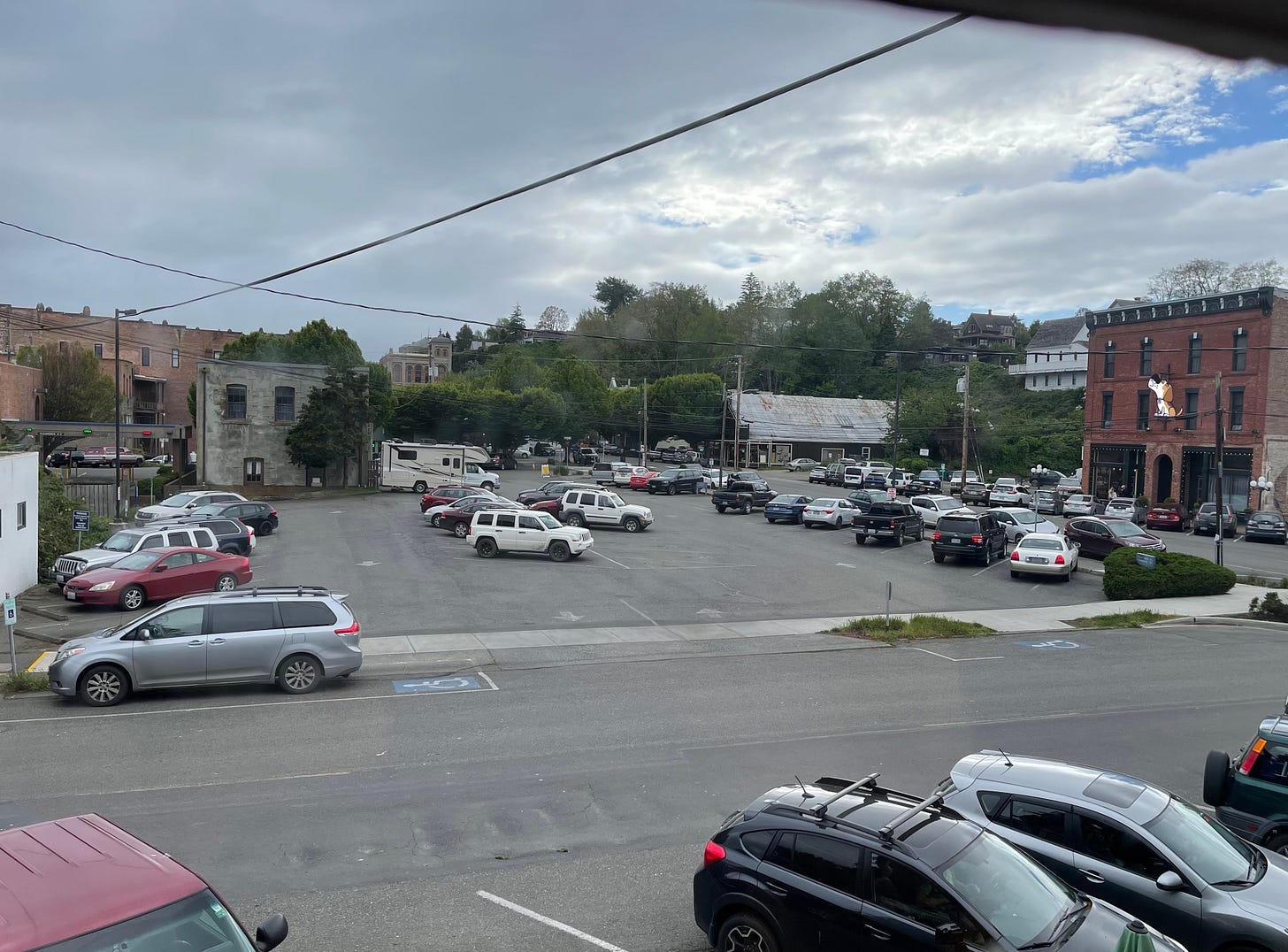Longtime Dishheads know my basic position on “reproductive freedom.” For all my Catholicism, I’m for it.
I believe in maximal sexual freedom for consenting adults in private. I favor widespread use of contraception to lower the odds of abortions and to foster the chances of wanted and loved children in stable families. I don’t believe that every sexual act can or should be open to procreation. I support legal abortion rights for all women, even though I personally cannot accept the morality of consciously ending a human life, especially one so vulnerable in the womb. But, critically, it is not my womb, and never could be, and women have an unalienable property right in their own body, even if it cradles another one within it. If we do not have agency over our own body, we have no agency and thereby no freedom at all. You gotta habeas the corpus.
Yes, this is in part an excruciating contradiction. But living in a liberal democracy requires excruciating contradictions all the time. That’s the core of what toleration in modernity means. It’s never easy. And no one designed it to be.
And there are, in any case, genuine questions about when a human life becomes a person with rights that cannot be definitively resolved, leaving the issue open to very reasonable doubt. And we should defer to each others’ right to differing judgments in our own respective lives and actions — even on as profound a matter as when life begins. Even Aquinas believed personhood begins 40 days after conception. The issue wasn’t settled then and it isn’t settled now.
And I’m in favor of any and all methods to help couples facing fertility issues. (That goes for gay and lesbian couples as well, of course, who cannot have kids by the conventional “mutual-fucking” technique.) And it has become somewhat disturbing that many on the theocon right have begun to target surrogacy as something that should be banned, even when all the relevant parties are quite clearly acting with full awareness and agency in engaging in it. If the mother has freely chosen this path, it is her decision and no one else’s. That too is what living in a liberal society requires.
So why do I find myself balking at some aspects of in vitro fertilization, or IVF?
The subject is fresh again. Alabama’s Supreme Court ruled in February that IVF was illegal under a 1872 state law that allowed parents to sue over the wrongful death of a minor child. The Southern Baptist Convention adopted a resolution opposing IVF last week, after which the Senate Democrats tried and failed to advance a bill protecting IVF access. The Democrats are politically smart on this: IVF remains hugely popular — on right and left, and it’s a better wedge issue than even abortion. Last month, a Pew survey found 70 percent support for the view that having access to IVF is a good thing; and even 60 percent of pro-lifers support access to IVF. It is, after all, an attempt to bring new life into the world, rather than to destroy it. Last week, Gallup found that 82 percent support the morality of IVF.
So why has it always made me queasy? It is not because I believe, as the Catholic Church teaches, that every child must be conceived through the sexual intercourse of a married couple, and that anything else is a violation of God’s law:
IVF involves the use of artificial means to achieve pregnancy outside of sex between a husband and wife, or “the marital act” — a disassociation that the Church teaches is contrary to the dignity of both parents and children.
I think, in fact, that a certain amount of “disassociation” is perfectly defensible if it is the only way of bringing a new life into the world. So what’s my problem?
The Alabama ruling focuses on the critical fact that in order to maximize the chances of just one successful human baby, you need to create multiple embryos to beat the high odds of reproductive failure. And once you’ve succeeded in implanting one future baby, you are inevitably left with the “spare” embryos, which you can then choose to freeze for future use, or donate to someone else, or — in the delicate language deployed in most medical descriptions — “discard”.
Money quote from the decision:
The central question presented in these consolidated appeals, which involve the death of embryos kept in a cryogenic nursery, is whether the Act contains an unwritten exception to that rule for extrauterine children — that is, unborn children who are located outside of a biological uterus at the time they are killed. Under existing black-letter law, the answer to that question is no: the Wrongful Death of a Minor Act applies to all unborn children, regardless of their location.
The law banning abortion, in other words, also directly bans IVF for the exact same reasons. An embryo is an embryo; and all embryos are human persons, however they were conceived. I suppose you can bash the justices for this kind of judicial activism. But what choice did they have, given the law they were interpreting?
“Discard”, moreover, is not just a euphemism. It’s an accurate description of what is going on. Discard, in the dictionary, means “to cast aside or dispose of; get rid of: to discard an old hat.” And in this case, it refers to several future human beings. Worrying about this is not — and should not be — restricted to religious fanatics. That same Gallup poll, for example, found that support for IVF went from 82 percent to 49 percent once the destruction of spare embryos was considered.
The number of embryos, mind you, is usually quite small. It varies depending on the age of the would-be mother — because fertilization is a crap shoot and you can get way more babies than you hoped for or way less. A typical procedure might yield just one viable embryo from, say, 12 in vitro; or it might, in very rare cases, yield 12. But in almost every case, a handful of human embryos is left over.
And that’s the rub for me. In many cases, you’re creating new lives only to destroy them as waste. In many others, you don’t destroy them; you merely use them to beat the odds. They are quite simply a means to an end, violating a basic norm of inviolable human dignity. And these “means” are your own offspring. IVF literally requires a mother to play Sophie’s Choice several times over.
And it’s harder to put these discarded humans out of your mind the way you can recover from an abortion, once the fetus has been dispensed with. Because they are still alive! By freezing them, you are conceding that they can one day change from a human being to a human person, with all the profound ramifications of that. And you may already have in front of you a growing IVF-created child who now has several siblings alive, just frozen in perpetual darkness.
That’s what brings it home to me. There are now more than 600,000 future human beings sitting in “cryogenic nurseries” waiting for the light to come on — millions of brothers and sisters, sons and daughters, consigned indefinitely to living in vitro. Yes, the embryo has no memory, no sentience when frozen, no mind or will yet. There is no suffering. But the lack of suffering does not mean there is no sadness. Or no humanity.
It’s also fair to acknowledge that our natural reproductive system when functioning normally is built in exactly the same way that IVF is designed: to create excess in order to guard against failure. And so we shouldn’t get too squeamish here — or become more protective of incipient human life than nature is. But at the same time, you also have to acknowledge that the IVF process, unlike nature, requires a human consciously picking and choosing the most viable embryo to keep alive, using DNA as a guide. In any other context, that is a form of eugenics — something many defenders of IVF are usually horrified by.
I don’t find this an easy position to take. I have good friends who have used these methods to have wonderful children. But the wonderful children always remind me of the equally wonderful brothers and sisters these kids have left behind in limbo. And the conscious choice to create a human life, and to keep it alive in perpetuity, but never allow it to breathe a single breath, disturbs me.
We all know parents who love one child more than the others — although love for every single one is hardwired within us. But this is loving one so much more you either kill the rest of her siblings, or consign them to eternal darkness — a limbo to surpass all limbos. In the non-utilitarian moral universe I live in, sacrificing many sons and daughters to create one is simply wrong. And if you see in humanness anything equivalent to an inviolable and eternal soul, it is evil.
Even when it is so plainly and patently motivated by good.
New On The Dishcast: Elizabeth Corey
Elizabeth is an academic and writer. She’s an associate professor of political science in the Honors Program at Baylor University and the author of the 2006 book, Michael Oakeshott on Religion, Aesthetics, and Politics. She also writes for First Things and serves on the board of the Institute on Religion and Public Life. After many of you asked me to do a podcast on my intellectual mentor, we delve into the thinking and life of Michael Oakeshott — the philosopher I wrote my dissertation on.
Listen to the episode here. There you can find two clips of our convo — on the genius who shirked fame, and my sole meeting with Oakeshott. That link also takes you to commentary on our episodes with Nellie Bowles on woke capture, George Will on conservatism, Bill Maher on religion, Daniel Finkelstein on marital support, Noah Smith on “information tournaments,” and Nicholas Wade on the lab-leak theory. Plus some thoughts on Pride Month and puppy training for Truman.
A Word About Keir
I keep being asked to offer my insight into the next prime minister of Great Britain, Keir Starmer, because we went to school together for several years, took the same public bus every day there and back, sat next to each other in class for five years, and spent almost our entire time arguing passionately and loudly about politics. One of us was going to be prime minister, our peers once joked. The joke is now on them.
But the truth is that I left the UK right after college at the age of 21, never went back, and obviously lost touch. I followed Keir’s career in the news with some interest over the decades; and many years ago I told everyone I knew in London — to widespread skepticism — that he’d be the next Labour leader. We got together again several years ago with a bunch of old schoolmates for an event to raise money for our old school. (I was paying for a scholarship for a young girl from a Bangladeshi immigrant family.) And we’ve hung out a couple of times since, because Keir really does keep in touch with old friends, and I was one of the extended school family.
And truth be told, while we once argued about literally everything, and were extremely competitive, our old friendship now trumps what were once absolutely ferocious political disagreements. He said he had admired Virtually Normal. I said I was proud of his work as a public prosecutor. I wouldn’t vote for his party, but I like the man and think he’ll make a fine PM. He was a much less constrained, much rowdier, and much more radical when he was a teenager — but then we all were. And I honestly have a hard time observing his tight-assed, super-careful parsing of everything through a shrewd political lens — when I recall just how crazy he used to be. But that’s what maturity is, I suppose. And, of course, what ambition does to you.
Which is really my only observation. Keir — named as he was after the very first Labour leader, Keir Hardie — has always been extremely ambitious. Being boring — as he is widely deemed to be — is a prerequisite for a successful leftist in UK politics, which is why, in my view, he has adopted that posture. But he isn’t actually boring. And he’s almost certainly more lefty than he’s letting on. Unlike other Labour moderates, he was happy to work for Corbyn before he expunged him. He may, in fact, because of sheer luck and timing, become a pivotal figure in the construction of a 21st century Britain. Some of it I won’t like. But friendship to me has always been more important than ideology. And I’m still proud to call this dirty commie a friend.
Money Quotes For The Week
“What I want to do, and what I will do is: You graduate from a college, I think you should get automatically, as part of your diploma, a green card to be able to stay in this country. And that includes junior colleges too — anybody who graduates from a college,” - former president Donald J Trump, casually junking the core part of his election message.
“It is unclear to many of us watching from the outside whether the president and his core team realize how dire the situation is right now, and whether they even have a plan to fix it. That is scary,” - a “Democratic strategist in touch with the campaign” to Axios.
“The very foundation of any good government is economic security, border security, national security. This is the foundation, the bedrock that our manifesto and our first steps, will be built upon,” - Keir Starmer, future Labour prime minister, touting border security as a central message.
“During the Blitz and in Ukraine, the public takes refuge underground. Every single one of the 2.2 million citizens of Gaza could fit in those [Hamas] tunnels underground. Not a single one of them has been admitted to those tunnels. There’s not a single bomb shelter built for civilians in the entirety of Gaza,” - Jake Wallis Simons.
Yglesias Award Nominees
“We [liberals] are more likely to believe that ‘housing is a human right’ than conservatives in Florida or Texas, but less likely to actually get people housed. We accept a yawning gulf between our values and our outcomes. … [T]he West Coast’s central problem is not so much that it’s unserious as that it’s infected with an ideological purity that is focused more on intentions than on oversight and outcomes,” - Nick Kristof.
“Why is TPUSA inviting someone who claims the Jews control the government to be a featured speaker at an event when the guy is also speaking at a white nationalist conference? Members of the Right, the antisemitism is not just on the left,” - Erick Erickson on Evan Kilgore.
The View From Your Window
Bergen, Norway, 1.02 pm
Dissents Of The Week
A reader responds to my latest column:
I was both perplexed and amused at the contortions you had to perform in order to say something nice about JD Vance while, necessarily, acknowledging his present canine subservience to Donald Trump. I think this is much simpler than you argued. Like other ambitious paladins of the Trumpublican Party (Graham, Scott, Hawley, Cotton, Cruz, Stefanik, etc.), Vance knows perfectly well — and has publicly acknowledged — that Trump is intellectually and morally unfit for that office. But like the rest of them, Vance is a craven careerist lickspittle and hypocrite who has determined that his personal ambition requires him to bend the knee, the country be damned. That is the entire story.
It’s also an eternal story in politics. Another writes:
I just read your column about JD Vance and illegal voting. This is why I think Trump is on track to lose. The 2020 election was 3.5 years ago now ... but Trump and most Republicans are still obsessed with it! Elections are about the future of the country, yet Trump is overwhelmingly focused on the past. He is running a backward-looking campaign.
This is reminiscent of the people who cannot get over being dumped or turned down by a love interest. I can understand being upset for three months. But after three years, you just need to get on with your life. I have been down that road, when my first gay crush rejected me badly. I felt terrible for about three months, but nowadays, I don’t even care if guys turn me down. I don’t obsess over the past.
Another defends Hillary:
I agree with pretty much everything you wrote in this column, but I definitely don’t understand your weirdly hyperbolic description of HRC as “the worst politician of her generation.” I mean, she did run for and win a Senate seat, and by most accounts she put her head down and was an effective and hardworking backbencher who worked across the aisle as much as, if not more than, any other Senator. She may have run a shitty presidential campaign, but “worst”??
A safe New York Senate seat? Not a major accomplishment. The only competitive elections she ever ran in ended in her defeat — at the hands of Obama and Trump, two real outliers that a minimally talented pol could have dispensed with easily.
Another reader has a “dissent to your dissent of a dissent”:
There is no way our economy will survive the retirement of Boomers without immigrants. Not for cheap labor, but for labor, period.
This week I met with a group of manufacturers. Their number one issue is labor — not the cost of it, but simply finding people to hire. They can’t find entry-level workers to train, and they struggle to retain trained workers even with pay incentives. I don’t know why so many prime-age males are couch-surfing instead of working, but it’s not because of immigrants. Assuming they don’t have drug problems, they could be in a job-training program to operate a machine tool tomorrow, at a middle-class wage.
Ironically, the manufacturers who have fully automated their plants find themselves wanting to hire more workers because they have unused capacity from the productivity improvements.
I am so tired of the negative narratives about workers being left behind. They weren’t. They aren’t. The US economy is as vibrant and adaptable as ever. Capitalism and liberal democracy still work. Trumpy populism is the threat to every thing that makes America great.
Keep the dissents coming: dish@andrewsullivan.com.
Mental Health Break
Hi everybody!
In The ‘Stacks
Josh Barro says duh, “of course Biden should attack Trump for being a felon.”
Noah Millman wonders, “Is populism possible without demagoguery?”
Why has Trump stopped going after big business?
Based on the European elections, Teixeira warns Democrats that a greenlash is coming this November.
The Ozempic lawsuits have begun.
Filipovic is much less torn over IVF than I am.
Vinay Prasad lists many ways that “medical school fails students”
China is soaring past the US and Europe in science.
Here’s a grim story by Nancy Rommelmann on the murder-friendly policies of woke Portland.
Here’s a new study showing that most German kids with gender-identity issues desist after five years.
Kiyah Willis, a former enby, gets personal about why she left the left — “not your typical red pill narrative.”
Tara Ella, a trans woman, stands up for normie politics — “pro-fact, pro-science, and skeptical of narratives.”
McWhorter tackles “the myth of low black self-esteem.”
Sam Kahn details “why I’m a pagan.”
Mary Harrington and Spencer Klavan talk conservative art — “cringe”.
Jesse Singal insists that “everyone ignored what should have been the most controversial part of Baby Reindeer.”
City kids should visit a farm.
Everyone should read Orwell.
Daniel Parris explores the question, “How does our sense of humor change with age?”
Jeff Mauer farts in the general direction of The Atlantic. Man, that piece sucked.
My best mate at Oxford joins the Free Press and calls the US the Soviet Union. Welcome, Niall!
The View From Your Window Contest
Where do you think? (The beagle cartoon was added to obscure a sign.) Email your entry to contest@andrewsullivan.com. Please put the location — city and/or state first, then country — in the subject line. Bonus points for fun facts and stories. Proximity counts. The deadline for entries is Wednesday night at midnight (PST). The winner gets the choice of a View From Your Window book or two annual Dish subscriptions.
See you next Friday.








